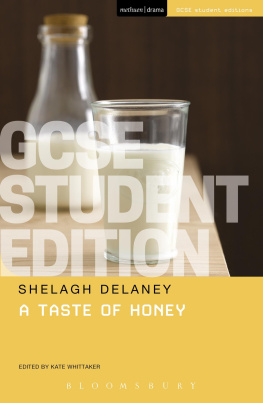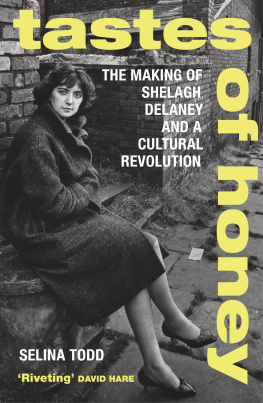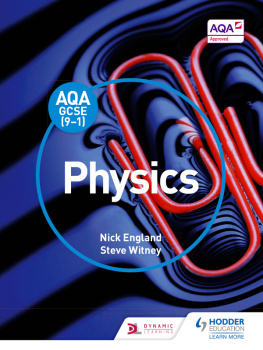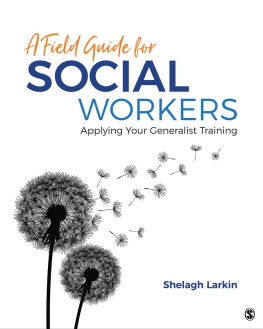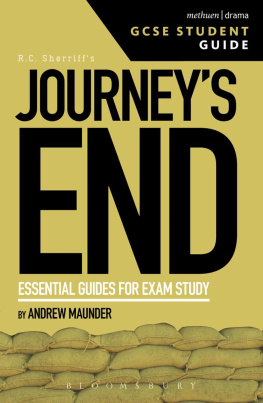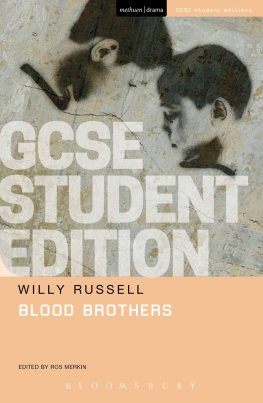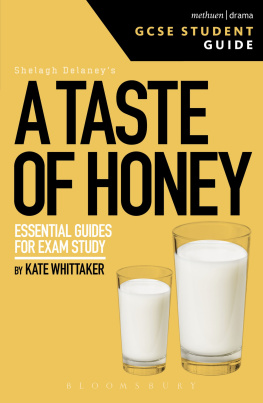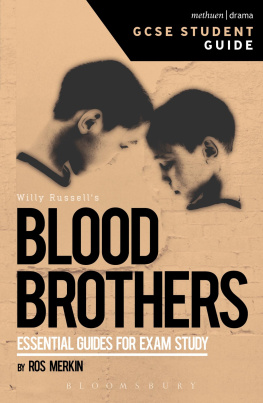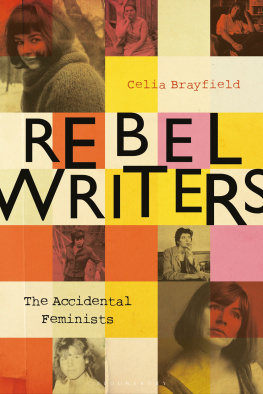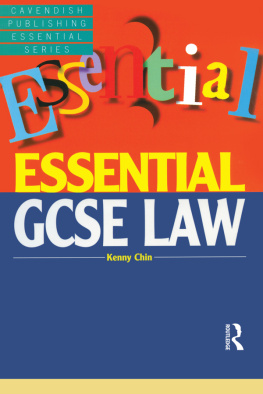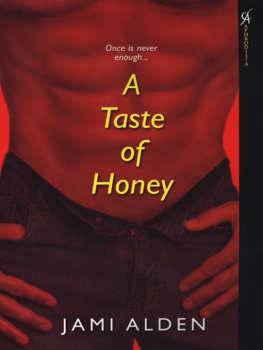Shelagh Delaney - A Taste of Honey GCSE Student Edition
Here you can read online Shelagh Delaney - A Taste of Honey GCSE Student Edition full text of the book (entire story) in english for free. Download pdf and epub, get meaning, cover and reviews about this ebook. year: 2016, publisher: Bloomsbury, genre: Children. Description of the work, (preface) as well as reviews are available. Best literature library LitArk.com created for fans of good reading and offers a wide selection of genres:
Romance novel
Science fiction
Adventure
Detective
Science
History
Home and family
Prose
Art
Politics
Computer
Non-fiction
Religion
Business
Children
Humor
Choose a favorite category and find really read worthwhile books. Enjoy immersion in the world of imagination, feel the emotions of the characters or learn something new for yourself, make an fascinating discovery.
- Book:A Taste of Honey GCSE Student Edition
- Author:
- Publisher:Bloomsbury
- Genre:
- Year:2016
- Rating:3 / 5
- Favourites:Add to favourites
- Your mark:
- 60
- 1
- 2
- 3
- 4
- 5
A Taste of Honey GCSE Student Edition: summary, description and annotation
We offer to read an annotation, description, summary or preface (depends on what the author of the book "A Taste of Honey GCSE Student Edition" wrote himself). If you haven't found the necessary information about the book — write in the comments, we will try to find it.
A Taste of Honey GCSE Student Edition — read online for free the complete book (whole text) full work
Below is the text of the book, divided by pages. System saving the place of the last page read, allows you to conveniently read the book "A Taste of Honey GCSE Student Edition" online for free, without having to search again every time where you left off. Put a bookmark, and you can go to the page where you finished reading at any time.
Font size:
Interval:
Bookmark:
GCSE Student Edition
Shelagh Delaney was born in Salford, Lancashire. She is most well-known for A Taste of Honey, for which she won the Foyles New Play Award and the New York Drama Critics Circle Award. She wrote the screenplay for the film version with Tony Richardson and was awarded the British Film Academy Award and the Robert Flaherty Award. Her other screenplays include The White Bus and Charley Bubbles, for which she won the Writers Guild Award. She has also written for television and radio and has had a collection of short stories published. She died in 2011.
Kate Whittaker is a former English and Drama teacher who has worked in a variety of UK secondary schools. She is Lecturer in Drama at Birmingham City University, specializing in post-war British and North American theatre.
Methuen Drama publications for GCSE students
Available and forthcoming
GCSE Student Editions
Willy Russells Blood Brothers
Simon Stephenss The Curious Incident of the Dog
in the Night-Time
Charlotte Keatleys My Mother Said I Never Should
Shelagh Delaneys A Taste of Honey
GCSE Student Guides
Willy Russells Blood Brothers by Ros Merkin
Simon Stephenss The Curious Incident of the Dog
in the Night-Time by Jacqueline Bolton
Dennis Kellys DNA by Maggie Inchley
Alan Bennetts The History Boys by Steve Nicholson
J. B. Priestleys An Inspector Calls by Philip Roberts
R. C. Sherriffs Journeys End by Andrew Maunder
Charlotte Keatleys My Mother Said I Never Should
by Sophie Bush
Shelagh Delaneys A Taste of Honey by Kate Whittaker

Shelagh Delaney was born on 25 November 1938 in Salford. This is a northern, industrial city that was then in Lancashire, and is now part of Greater Manchester. Originally, her forename was spelt Sheila; her decision to change it to an alternative, Irish spelling was likely because one side of her fathers family were from Ireland. Delaneys family was working-class and not very wealthy her father worked as a ticket inspector on buses and she moved house and primary school within Salford several times during her childhood. This was partly because of World War Two (193945), during which the city was bombed. Although Delaney failed the Eleven Plus entrance examination for grammar school, she was transferred from a secondary modern to a grammar aged fifteen, and left with five GCEs (the equivalent of todays GCSEs): her only academic qualifications.
Delaney had various jobs after leaving school, including that of sales assistant. It was while working in a cinema that she began writing a novel that was eventually to become A Taste of Honey. She decided to change it into a play after seeing a performance of Variations on a Theme (1958) by Terence Rattigan, a famous British playwright. Allegedly, this was because seeing Rattigans work about the personal lives of wealthy, privileged people made Delaney think that she could write a better drama herself.
In 1958, aged nineteen, Delaney sent the completed script of Honey to Joan Littlewood, a theatre director who ran the Theatre Workshop Company based in Londons Theatre Royal, Stratford (now called Stratford East). Although Delaney had only sent the play to Littlewood for some feedback, the Theatre Workshop began rehearsals almost immediately; Honey premiered weeks later, on 27 May. It was so successful that the production transferred to a more central (West End) London theatre. It has continued to be performed regularly in British theatres since this period and was adapted into a film in 1961.
The Lion in Love (1960) was Delaneys second play, and disappointed some writers and theatre critics who felt it did not match the standard of her earlier work. Both of these plays are mentioned in Ken Russells Shelagh Delaneys Salford (1960), a short television documentary film in which Delaney talks about her home city and her writing. Although she never produced anything else as famous or celebrated as Honey, Delaneys career as a writer of drama for theatre, radio, film and television spanned fifty years. Sweetly Sings the Donkey (1963), another early work, was a collection of semi-autobiographical short stories based upon her childhood. She received various awards and accolades, including the 1962 BAFTA for Best British Screenplay for the film of Honey (co-written by Tony Richardson).
Delaney died in 2011. In 2014, her former friend, the artist Harold Riley, unveiled a commemorative plaque at the house on Duchy Street in Salford where she had written A Taste of Honey.
The dramas title also describes one of its themes. The expression a taste of honey comes from a Bible story in which a man called Jonathan is threatened with death for breaking a fast by eating some honey. Delaney uses this idea metaphorically: Jo, Helen and Geof but the female characters in particular are in some way punished for giving into temptation and taking opportunities for happiness. The word taste highlights that periods of joy are always short-term in the play. Both Jo and Helen are impulsive, and jump at the chance for their tastes of honey; however, they do not complain when these experiences prove to be temporary.
Motherhood is central to the play, and its most important theme. Traditionally, in our society, motherhood has been considered key to female identity and experience. An expectation that women will have maternal instincts is a crucial part of this idea. While many people no longer hold this view, it was commonplace in the 1950s, when the play was written. Delaneys portrayal of motherhood is rebelliously unconventional, challenging the views and values of the society in which she lived.
The sole biological mother in the play, Helen differs starkly from an ideal maternal figure. She abandons Jo in both acts: to go on holiday with fianc Peter towards the start of the play, and to go to the pub at the end on learning that the father of Jos unborn child is black. Often, Helen is a casually neglectful and thoughtless mother. For instance, in the first scene, following a Loud bang (32) from the kitchen stove that Jo is trying to use, Helen expresses not concern, but annoyance: The way she bangs about! (33). Helen makes reference to the poor quality of Jos clothing and refuses to cook for her before going away with Peter.
Much of the attention that Helen does give Jo comprises insults and threats. This includes the recurring claim that Jo is a source of irritation, and a string of criticisms about her attitude and appearance. Helens threats of physical violence punctuate their exchanges, although she does not actually hit Jo. Indeed, the closest Helen comes to this is chasing her around the flat in Act Two, Scene One, enraged by the news of the pregnancy. However, this is more likely to be humorous than threatening when staged, reflecting the influence of the performance styles explored under Dramatic devices.
During her pregnancy, Jo also deviates from ideal maternal behaviour. In contrast with Geofs nurturing attitude to her and the unborn child, Jo reacts to forthcoming motherhood with aggression and negativity. Violent imagery features in her lines about the baby, and the audience see an actual image of violence when Jo responds to Geofs present of a baby doll by throwing it to the floor. This act of rejection, while Jo is visibly pregnant, is a symbol of her refusal to embrace societys expectations. More generally, her aggressive manner contrasts with the gentle, caring behaviour expected of pregnant women and mothers, even more so in the fifties than today.
Font size:
Interval:
Bookmark:
Similar books «A Taste of Honey GCSE Student Edition»
Look at similar books to A Taste of Honey GCSE Student Edition. We have selected literature similar in name and meaning in the hope of providing readers with more options to find new, interesting, not yet read works.
Discussion, reviews of the book A Taste of Honey GCSE Student Edition and just readers' own opinions. Leave your comments, write what you think about the work, its meaning or the main characters. Specify what exactly you liked and what you didn't like, and why you think so.

